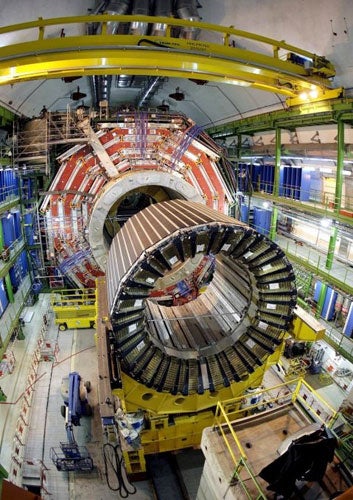Hadron collider out of action until spring

Your support helps us to tell the story
From reproductive rights to climate change to Big Tech, The Independent is on the ground when the story is developing. Whether it's investigating the financials of Elon Musk's pro-Trump PAC or producing our latest documentary, 'The A Word', which shines a light on the American women fighting for reproductive rights, we know how important it is to parse out the facts from the messaging.
At such a critical moment in US history, we need reporters on the ground. Your donation allows us to keep sending journalists to speak to both sides of the story.
The Independent is trusted by Americans across the entire political spectrum. And unlike many other quality news outlets, we choose not to lock Americans out of our reporting and analysis with paywalls. We believe quality journalism should be available to everyone, paid for by those who can afford it.
Your support makes all the difference.The Large Hadron Collider (LHC) near Geneva will be out of action until the spring while engineers investigate a fault, it was announced.
A large amount of helium leaked into the tunnel on Friday, forcing the £3.6 billion particle accelerator to be shut down, less than 10 days after the start of the project which scientists hope will unravel the secrets of the first moments of the universe.
The European Organisation for Nuclear Research (Cern), which is running the experiment, said an initial investigation suggested a faulty electrical connection between two of the accelerator's magnets could be to blame.
The collider requires temperatures just above absolute zero (-273.15 degrees C) to allow particles to be steered around the circuit.
But as a result of the fault, the temperature of the magnets rose by about 100C.
The affected area of the 27km (16.8 mile) tunnel must be brought up to room temperature to allow engineers to inspect the magnets, and this process will take three or four weeks.
Robert Aymar, director general of Cern, said: "Coming immediately after the very successful start of LHC operation on September 10, this is undoubtedly a psychological blow.
"Nevertheless, the success of the LHC's first operation with beam is testimony to years of painstaking preparation and the skill of the teams involved in building and running Cern's accelerator complex.
"I have no doubt that we will overcome this setback with the same degree of rigour and application."
Cern said the time needed to repair the fault meant there was no chance the accelerator would start up again before the scheduled winter maintenance period, meaning the LHC would not be activated until spring 2009.
Join our commenting forum
Join thought-provoking conversations, follow other Independent readers and see their replies
Comments